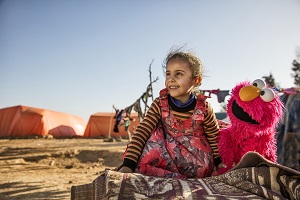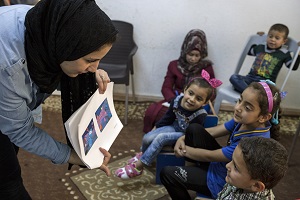|
Nonprofits that treat people
with disabilities equally awarded $145 million in
funding from MacArthur Foundation
Washington, D.C., February 16, 2018 – The John D.
and Catherine T. MacArthur Foundation joined a small
cadre of exceptional
champions for inclusion and equalityby awarding
$145 million in grants to groundbreaking projects
that will include people with disabilities equally
in their work. MacArthur’s initiative, 100&Change,
is a competition for a $100 million grant to fund a
single proposal that promises real and measurable
progress in solving a critical problem of our time.
A part of the MacArthur Foundations’ review was a
series of questions and
a check
list to ensure the inclusion of people with
disabilities in multiple aspects of the grant
recipients proposed projects.
“Historically, major philanthropists have not asked
potential grantees to see and treat people with
disabilities equally,” said Jennifer Laszlo Mizrahi,
president of RespectAbility, a nonprofit that fights
stigma and advances opportunities for people with
disabilities. She is also the co-founder/director of
the Mizrahi Family Charitable Fund. “Funders who
would never imagine funding groups that discriminate
due to race or gender sadly discriminate against
people with differing abilities. Often, it’s not a
question of will, but of skill, as even the
best-intended philanthropists often do not know how
to include people with disabilities. However,
MacArthur has now raised the bar on equality by
including the one-in-five people on earth who have a
disability.”
Never before has a grant anywhere near this size
asked grantees to address how they plan to ensure
access to benefits for persons with disabilities.
Based on the strong ideas from each of the teams,
the MacArthur Foundation decided to grant three
finalists with $15 million each. Thus, the four
winners collectively were awarded $145 million.
 |
|
A young girl engages with
Elmo at an informal tented settlement
near Mafraq, Jordan, in February 2017
Photo courtesy of Sesame
Workshop / Ryan Heffernan |
The $100 million-dollar grant was awarded to Sesame
Workshop and International Rescue Committee (IRC)to
educate young children displaced by conflict and
persecution in the Middle East. Sesame Workshop and
IRC will use the $100 million grant to implement an
evidence-based, early childhood development
intervention designed to address the "toxic stress"
experienced by children in the Syrian conflict
region—Jordan, Lebanon, Iraq, and Syria. The project
will improve children's learning outcomes today and
their intellectual and emotional development over
the long term. Children and adults with
disabilities will have equal access to every aspect
of the project.
The 100&Change finalists that received $15 million
grants are:
 |
Children take part in
formative research conducted by Sesame
Workshop and International Rescue Committee
at a women’s center in Mafraq, Jordan, in
May 2017.
Photo courtesy of Sesame
Workshop / Parisa Azadi
|
RespectAbility has invited all four winners to
answer a series of questions about that they did to
meet the challenge of including people with
disabilities equally. We will share their responses
in the coming weeks. The first answers seen
below come from the recipients of the $100 million
investment, Sesame Workshop and International Rescue
Committee (IRC).
RespectAbility: MacArthur sent you
the 100&Change accessibility
and inclusion checklist, a self-assessment tool
developed by Access
Living. The 100&Change checklist had a wide
range of questions around disability. Many leaders
and organizations “don’t know what they don’t know”
about disabilities and inclusion. What from that checklist was
already familiar to you and your team, and was
already a part of your plan and work?
Sesame/IRC: Inclusion has been a
guiding principle for our partnership since its
inception in May 2016—it’s in our DNA, and respect
for people with disabilities is integral to both
Sesame Workshop and the International Rescue
Committee.
For example, Sesame Workshop has a long track record
of celebrating similarities and differences by
positively portraying both humans and Muppets with a
range of abilities. Sesame Street productions in the
U.S. and around the world have featured children
with Down's syndrome, hearing and visual
impairments, and, in Israel and France, Muppets
Sivan and Griotte use wheelchairs. Sesame Street's
newest character, Julia, has autism—with research
showing that Sesame's autism initiative has resulted
in significant increases in acceptance and inclusion
of children with autism spectrum disorders.
Since 2012, the IRC has been a global leader for
Protection Mainstreaming across the humanitarian
sector and has developed comprehensive training
packages and innovative tools to ensure that our
field staff and our partners are trained and are
implementing programs that adhere to our Safe
Programming standards, which have a specific
emphasis on disability inclusion.
Research suggests that 1 in 5 Syrian refugees suffer
acute physical, sensory, or intellectual disability
as a result of the war, making it all the more
important to account for disability and inclusion at
every step of the way.
The characters created for this new initiative will
model how to make learning and play more inclusive,
and television, multimedia, and print materials will
represent persons with disabilities and promote
inclusiveness among children and their caregivers.
In collaboration with Handicap International,
persons with disabilities will participate in our
regional needs assessments to shape content, monitor
programs, and employ accessible distribution methods
such as subtitles and multimedia enhancements.
Moreover, the IRC is on the steering committee of
the Washington Group on Disability Statistics, a
U.N. subgroup tasked with developing international
measures of disability. Through this relationship,
the measured impact of our program will guide the
use of disability measures in humanitarian response
settings for years to come.
Lastly, NYU’s research center, Global TIES for
Children, will serve as our independent research
partner, conducting rigorous evaluations of the
implementation of the program and its impact on
children and families. In collaboration with experts
from various scientific backgrounds and partners in
the region, we will build the scientific evidence
base on how best to support young children’s
development in humanitarian settings. For example,
we will look at the factors involved in a young
child's response to stressful life events, how
caregivers' level of stress and mental health
influence a child's neurobiological functioning, and
how strengthening caring and nurturing relationships
can buffer a child from events in their environment
and protect the developing brain from the harmful
effects of prolonged exposure to stress.
RespectAbility: What on that
checklist was new to your project and team?
Sesame/IRC: While the issues
highlighted by the checklist are also critical
concerns that our organizations strive to address in
all of our programming, we applaud the Foundation
for putting disability and inclusion at the
forefront of the proposal process. The guidelines
helped us ensure that we were accounting for
disability and inclusion throughout each phase of
our program, and we are actively engaging with
outside advisors to encourage us to think
differently and ensure that inclusivity is woven
throughout our entire initiative.
RespectAbility: What were some of
the things that you added or changed to address the
issues on the checklist?
Sesame/IRC: The guidelines helped
ensure that we were explicit in our plans to create
an inclusive program in our proposal, and they will
continue to serve as a guide as we refine plans and
begin rolling out this new initiative. Inclusion is
top of mind for our organizations, and it’s
important to note that we both have a long history
of prioritizing disability inclusion. For example,
the IRC already adheres to the disability inclusion
guidelines that have been designed for humanitarian
response.
RespectAbility: How did that impact
your staffing, oversight or budget, if at all?
Sesame/IRC: Disability inclusion
processes are embedded in multiple components of our
proposal and budget, including the needs assessment,
program design, implementation, monitoring, and
more. For example, we will be conducting a
disability inclusion workshop for key stakeholders
and staff within the region in the first phase of
the project, and we will work with Handicap
International and other advisors to help inform our
process.
RespectAbility: Did you reach out
to experts on disability issues to help you in the
process?
Sesame/IRC: Absolutely. Since the
partnership’s inception, we’ve worked with
disability experts within the region to discuss
programming ideas, and we will continue to engage
with individuals with disabilities and global and
local advisors on disability issues throughout the
process. For example, we’ve enlisted Handicap
International’s assistance in the mobilization and
coordination of key disability actors within the
region and globally, as well as technical support as
we design, implement, monitor and evaluate the
program.
RespectAbility: Did the questions
or process add new thinking to your team? If so, in
what way?
Sesame/IRC: The MacArthur
Foundation’s commitment to prioritizing inclusion in
the application process ensured that we were
explicit and deliberate in our plans to meaningfully
include people with disabilities in our proposal.
Moving forward, the guidelines are a useful tool to
keep inclusion top of mind, encouraging us to think
differently when it comes to inclusion.
RespectAbility: As you move
forward, how can people and organizations who care
about disability issues be helpful to your success
in the future? If people want to support their work,
where can they donate?
Sesame/IRC: To learn more about the
program and keep up with its progress, visit our
joint website, http://refugee.sesameinternational.org/,
and follow us on social media at @SesameWorkshop and
@theIRC.
RespectAbility: What advice would
you give to other leaders and groups who also want
to be mindful of including people with disabilities
equally in their teams, work and impact?
Sesame/IRC: Inclusion requires
meaningful participation and empowerment of people
with disabilities throughout the planning and
implementation process. True inclusion requires
building an inclusive culture within an
organization, as well as ensuring that those you
serve are at the center of decision-making processes
that affect their lives. Both of our organizations
have a long history of giving voice to the most
vulnerable members of society, and we’re proud to
continue that commitment in this historic
partnership.
RespectAbility is deeply grateful to The John D. and
Catherine T. MacArthur Foundation for its commitment
to diversity, equity and equality for the more than
1.2 billion people with disabilities on earth.
RespectAbility offers free guidance to foundations,
funders, nonprofits and others on how they too can
ensure that their work is accessible to people of
all abilities. For more information contact
JenniferM@RespectAbility.org
|